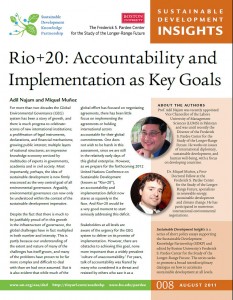Adil Najam Presents Paper on Rio+20 in Johannesburg
 Prof. Adil Najam, former Director of the Frederick S. Pardee Center for the Study of the Longer-Range Future, and co-author of the recent Pardee Center paper “Rio+20: Accountability and Implementation as Key Goals” presented this paper and some of the larger findings emerging from various Pardee Center activities related to Rio+20 at an Africa-wide preparatory consultation for Rio+20. The consultation was organized by the International Institute for Sustainable Development (IISD) as part of a larger initiative to seek African perspectives on Rio+20. The consultation was held in Johannesburg, South Africa, and included government, civil society and academic representatives from across the African continent.
Prof. Adil Najam, former Director of the Frederick S. Pardee Center for the Study of the Longer-Range Future, and co-author of the recent Pardee Center paper “Rio+20: Accountability and Implementation as Key Goals” presented this paper and some of the larger findings emerging from various Pardee Center activities related to Rio+20 at an Africa-wide preparatory consultation for Rio+20. The consultation was organized by the International Institute for Sustainable Development (IISD) as part of a larger initiative to seek African perspectives on Rio+20. The consultation was held in Johannesburg, South Africa, and included government, civil society and academic representatives from across the African continent.
In his presentation Prof. Adil Najam focused on the governance aspects of the Rio+20 agenda and highlighted the need to contextualize environmental governance within a sustainable development framework and to focus on accountability and implementation as key pillars of the global governance enterprise.
Over the past two decades, the Global Environmental Governance (GEG) system has grown and evolved, making much progress in incorporating sustainable development as the central goal of environmental governance, and delivering scores of new international institutions, legal instruments, declarations and financial mechanisms. However, the GEG system lacks the crucial components of accountability and implementation as part of its core operating system. The authors argue that the upcoming Rio + 20 meeting provides the perfect opportunity to help bring about these much needed changes to strengthen the GEG and help achieve its ultimate goals. The authors propose a set of four accountability-enabling mechanisms:
1. Improved metrics and reporting mechanisms.
2. Transparency mechanisms.
3. Compliance mechanisms.
4. Capacity building.
The authors also propose a set of four enabling institutional arrangements:
1. Compendium of best (and worst) practices.
2. Registry of commitments.
3. Renewed focus for CSD.
4. A global “Aarhus” instrument.
Download a PDF version of the paper here.